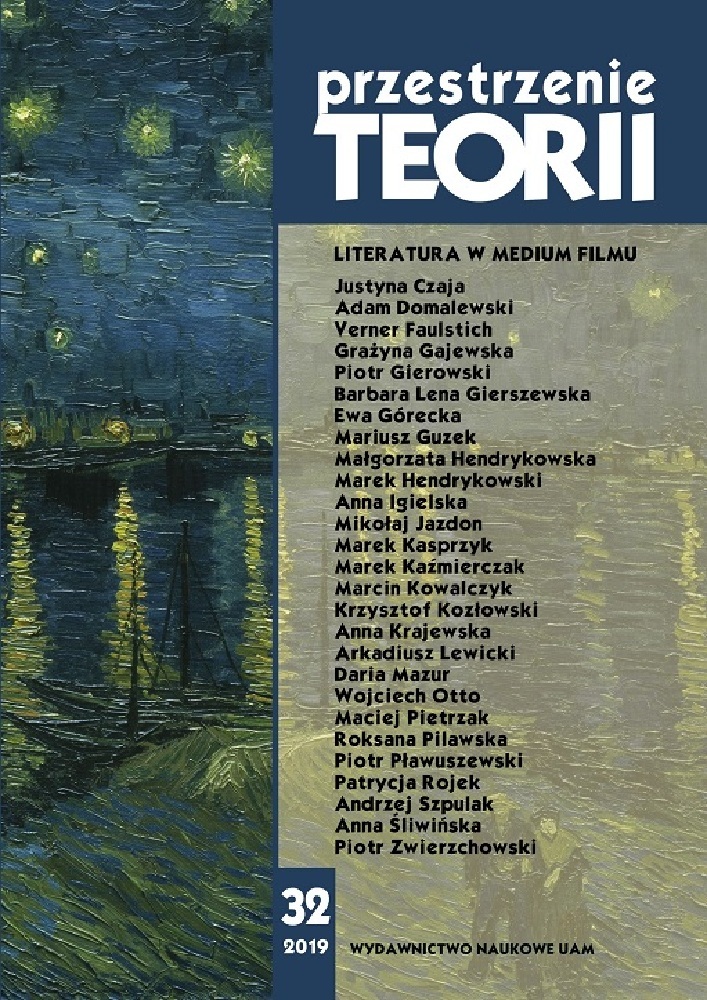Abstract
Kowalczyk Marcin, Człowiek kultury druku w świecie przyszłości – kino science fiction wobec teorii środków przekazu Marshalla McLuhana [Man of Print Culture in the Future World – Science Fiction Cinema and Marshall McLuhan’s Media Theory]. „Przestrzenie Teorii” 32. Poznań 2019, Adam Mickiewicz University Press, pp. 239–255. ISSN 1644-6763. DOI 10.14746/pt.2019.32.12.
This article shows the way of presenting the characters who represent print culture in science fiction cinema. All the printed artifacts, like literature, books and letters, are defined according to Marshall McLuhan’s media theory. The analysis is based mostly on the movie Her (dir. Spike Jonze, 2013) and discusses how SF movies adapt and transform the twentieth-century predictions concerning print as a medium. This approach allows us to avoid a simple interpretation of the problem, where books or print become merely a sign of civilization that has passed. Furthermore, McLuhan’s theory helps effectively reveal the complex motivations of the characters who are shaped by a specific medium.
References
OPRACOWANIA
Barthes R., Rzymianie w filmie, [w:] Mitologie, przeł. A. Dziadek, Warszawa 2008, s. 47–49.
Bobryk J., Twórczość w epoce technologii cyfrowej, [w:] Teksty kultury uczestnictwa, red. A. Dąbrówka, M. Maryl, A. Wójtowicz, Warszawa 2016, s. 197–222.
Booker M.K., Alternate Americas: Science Fiction Film and American Culture, Westport–Connecticut–London 2006.
Brody R., Ain’t Got No Body, “The New Yorker” 2013.12.19., <https://www.newyorker.com/culture/richard-brody/page/72> [dostęp: 21.08.2019].
Dargis M., Disembodied, but, Oh, What a Voice, „The New York Times” 2013.12.17., <https://www.nytimes.com/2013/12/18/movies/her-directed-by-spike-jonze.html> [dostęp: 21.08.2019].
Dróżdż A., Od Liber mundi do hipertekstu. Książka w świecie utopii, Warszawa 2009.
Dukaj J., Po piśmie, Kraków 2019.
Dukaj J., Podróż międzywymiarowa, czyli z biblioteki do kina i z powrotem. Wokół „Interstellar” Christophera Nolana, „Kultura Liberalna” 2014, nr 48, <https://kulturaliberalna.pl/2014/12/02/jacek-dukaj-interstellar/> [dostęp: 28.08.2019].
Gomez J., Print is Dead. Books in Our Digital Age, London–New York–Melbourne–Hong Kong 2008.
Gorodecka A., Artefakt kulturowy w humanistyce, „Przestrzenie Teorii” 2015, nr 23, s. 53–69.
Kermode M., „Her” – review, “The Guardian” 2014.02.16., <https://www.theguardian.com/film/2014/feb/16/her-spike-jonze-joaquin-phoenix-review> [dostęp: 20.08.2019].
Kernan A., The Death of Literature, New Haven and London 1990.
Kukiełko-Rogozińska K., Naukowiec czy artysta? Polskie interpretacje poglądów Marshalla McLuhana, „Kultura Popularna” 2013, nr 3, s. 160–172.
Levinson P., Digital McLuhan. Guide to the Information Millennium, London 2004.
Liquid metal. The Science Fiction Film Reader, red. S. Redmond, New York 2007.
Loska K., Dziedzictwo McLuhana. Między nowoczesnością a ponowoczesnością, Kraków 2001.
Maryl M., Kulturowa piśmienność: projekt badań totalnych kultury literackiej, „Teksty Drugie” 2015, nr 3, s. 9–29.
McCarthy T., „Her”: Film Review, “The Hollywood Reporter” 2013.12.10., <https://www.hollywoodreporter.com/review/her-film-review-648073> [dostęp: 21.08.2019].
McLuhan E., The Source of the Term, “Global Village”, “McLuhan Studies” 1999, Issue 2, <http://projects.chass.utoronto.ca/mcluhan-studies/v1_iss2/1_2art2.htm> [dostęp: 25.08.2019].
McLuhan M., Galaktyka Gutenberga, przeł. A Wojtasik, Warszawa 2017.
McLuhan M., The Agenbite of Outwit, “McLuhan Studies” 1999, Issue 2 (pierwsza publ. 1963), <http://projects.chass.utoronto.ca/mcluhan-studies/v1_iss2/1_2art6.htm> [dostęp: 25.08.2019].
McLuhan M., Wybór tekstów, red. E. McLuhan, F. Zingrone, przeł. E. Różalska, J.M. Stokłosa, Poznań 2001.
McLuhan M., Zrozumieć media. Przedłużenie człowieka, przeł. N. Szczucka, Warszawa 2004.
McLuhan M., Fiore Q., The Medium is the Message: An Inventory of Effects, Corte Madera 2001.
McLuhan’s Global Village Today. Transatlantic Perspective, red. C. Birkle, A. Krewani, M. Kuester, Vermont 2014.
Ogonowska A., Twórcze metafory medialne, Kraków 2010.
Ong W.J., Oralność i piśmienność: Słowo poddane technologii, przeł. J. Japola, Lublin 1992.
Orr C., Why Her Is the Best Film of the Year, “The Atlantic” 2013.12.20., <https://www.theatlantic.com/entertainment/archive/2013/12/why-em-her-em-is-the-best-film-of-the-year/282544/> [dostęp: 21.08.2019].
Przybyszewska A., Między materialnością a wirtualnością. Przypadek książek rzeczywistości rozszerzonej, „Teksty Drugie” 2014, nr 3, s. 86–108.
Radwański A., Szanujmy McLuhana, „Bibliotekarz” 1998, nr 10, s. 3–6.
Redmond S., Liquid Metal. The Science Fiction Film Reader, New York 2007.
Rettberg S., Budowanie wspólnoty wokół literatury elektronicznej, „Teksty Drugie” 2015, nr 3, s. 135–155.
Schwartz R.B., After the Death of Literature, Edwardsville 1992.
Skweres A., McLuhan’s Galaxies: Science Fiction Film Aesthetics in Light of Marshall McLuhan’s Thought, Berlin 2019.
Staszczyszyn B., Miłość – niemożliwy projekt, „Filmweb” 2014.01.23., <https://www.filmweb.pl/review/Mi%C5%82o%C5%9B%C4%87+%E2%80%93+niemo%C5%BCliwy+projekt-15291> [dostęp: 21.08.2019].
Striphas T., The Late Age of Print. Everyday Book Culture from Consumerism to Control, New York 2009.
Swirski P., From Literature to Biterature: Lem, Turing, Darwin, and Explorations in Computer Literature, Philosophy of Mind, and Cultural Evolution, Montreal 2013.
Teolette J.P., Science Fiction Film, Cambridge 2004.
The Philosophy of Science Fiction Film, red. S.M. Sanders, Kentucky 2008.
Vanhemert K., Why „Her” will Influence the Future of UI Design Even More Than „Minority Report”, “Wired” 2014.01.14., <https://www.wired.co.uk/article/her-ui-design> [dostęp: 30.01.2019].
Zid B.M., Literature of the Future and the Future of Literature, “Studies in Literature and Language” 2016, t. 12, nr 4, s. 1–5.
FILMOGRAFIA
Blade Runner 2049, reż. Denis Villeneuve, 2017.
Dawca pamięci (The Giver), reż. Phillip Noyce, 2014.
Equilibrium, reż. Kurt Wimmer, 2002.
Her, reż. Spike Jonze, 2013.
Interstellar, reż. Christopher Nolan, 2014.
Księga ocalenia (The Book of Eli), reż. Albert Hughes, Allen Hughes, 2010.
Matrix (The Matrix), reż. Lilly Wachowski, Lana Wachowski, 1999.
License
Authors
Authors of texts accepted for publication in Przestrzenie Teorii are required to complete, sign and return to the editor's office the Agreement for granting a royalty-free license to works with a commitment to grant a CC sub-license.
Under the agreement, the authors of texts published in Przestrzenie Teorii grant the Adam Mickiewicz University in Poznań a non-exclusive, royalty-free license and authorize the use of Attribution-NonCommercial-NoDerivatives 4.0 International (CC BY-NC-ND 4.0) Creative Commons sub-license.
The authors retain the right to continue the free disposal of the work.
Users
Interested Internet users are entitled to use works published in Przestrzenie Teorii since 2015, for non-commercial purposes only, under the following conditions:
- attribution - obligation to provide, together with the distributed work, information about the authorship, title, source (link to the original work, DOI) and the license itself.
- no derivatives - the work must be preserved in its original form, without the author's consent it is not possible to distribute the modified work, such as translations, publications, etc.
Copyrights are reserved for all texts published before 2015.
Miscellaneous
Adam Mickiewicz University in Poznań retains the right to magazines as a whole (layout, graphic form, title, cover design, logo etc.).
